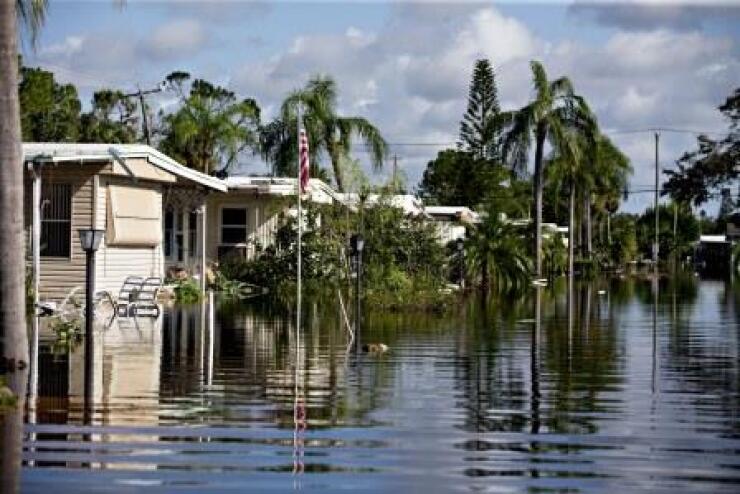Ygrene Energy Fund achieved its most favorable pricing to date in closing its third PACE bond securitization deal this week.
GoodGreen 2017-2, a $280.4 million transaction of bonds issued under Property Assessed Clean Energy (PACE) programs in California and Florida, closed with a Class A note interest rate of 3.26%, the lowest of any PACE industry deal to date, according to Ygrene. A company official cited increased interest among asset managers in the emerging esoteric asset class of property assessed clean energy bonds.
“We were really pleased with the investor reception,” Ygrene's chief financial officer, Tim Condon, told Asset Securitization Report. “We were somewhere between two or three times oversubscribed, and we have some [added] participation from some large institutional investors you would recognize.”
The GoodGreen 2017-2 Class A notes were sized at $244.8 million, and just like its first two deals were rated AAA by Morningstar Credit Services. Only one other PACE issuer, Renovate America,

Kroll Bond Rating Agency assigned an AA rating to Ygrene's new deal, similar to its prior ratings of Ygrene and other PACE issuers it covers. Both Kroll and bond rating agency DBRS have capped PACE deal senior note ratings at AA due to the minimal performance history of deals dating back late 2014.
Firms such as Ygrene, Renovate America, and Renew Financial provide long-term financing through local PACE programs providing property owners access to residential and small-commercial energy and water efficiency improvements, including solar-panel installations. The PACE accounts are repaid through twice-annual property tax levies by local government entities who use the proceeds to support limited obligation bonds securitized through lender ABS platforms such as Revonate’s HERO and GoodGreen.
Along with two privately placed securitizations with insurer Global Atlantic Financial Group, Ygrene has now issued $935 million in ABS deals to date, according to the company. Ygrene is the PACE industry's second-largest sponsor of asset-backed deals behind Renovate America's $2.2 billion in HERO platform issuance since 2014.
The Class A notes have initial credit enhancement of at least 7.91%, based on excess spread, overcollateralization, a 2.7% subordination of the Class B and C notes, a 0.2% liquid reserve account, as well as an interest rate reserve account that was funded at closing with $600,000.
In a cash-flow stress scenario, Morningstar determined that both the Class A and B notes totaling $6.8 million in GoodGreen 2017-2 passed the 'AAA' modeling test showing no disruption in principal and interest cash flows. But Morningstar assigned only an A rating to the B notes, due to the low levels of credit enhancement (0.3%) supporting the junior notes.
For the first time, Ygrene is keeping some skin in the game through a $28.8 million Class C residual note tranche representing an 11.6% stake in the deal. The firm plans to market the notes to equity and residual shareholder investors, according to Condon. The Class C coupon is 5%, according to Kroll.
For Ygrene’s second deal of 2017, the company pooled 10,659 projects across 9,438 properties with a total assessment balance of $252.4 million. Most of the accounts are in California across a 40-county area (56.9% of the pool) and the remainder in Florida (43.1%), a fast-growing market for the company.
While most PACE projects in California are for home energy efficiency upgrades, including solar-panel installations and HVAC systems, Ygrene's Florida business has been rapidly expanding through homeowners using PACE financing to strengthen homes against hurricanes, according to Condon. More than 36% of the projects in Florida are hurricane-preparedness related, compared to 20% for HVAC and 16% for solar-panels.
“In Florida our applications tripled [in 2017], as people wanted some ‘hurricane-hardening’ improvements,” said Condon. “I believe that down the road we will also see some movement toward flood resiliency [projects]. ... It’s become not just an energy discussion.”
Ygrene has recently launched originations of PACE financing in Missouri, but its securitizations have yet to include any accounts from the Show Me State.
Despite the growth of the industry and expansion of issuance, PACE programs have come under attack by the financial services industry. Banks, joined by realtor groups, have opposed expanding PACE because of controversial lending practices that underwrite loans to the values of homes rather than borrower credit (Renovate America recently launched a credit-scoring system to better ascertain a borrower’s income and ability to repay).
They also oppose PACE assessments carrying a first-lien position on a home equal to property-tax assessments, a fixture opposed by the Federal Home Loan Finance Agency which disallows GSE home-mortgage guarantees on new Freddie Mac/Fannie Mae mortgage originations and refinancings.
The opposition to PACE has manifested in Washington with efforts to thwart the industry this year. Three U.S. senators
To stem the criticism and the legal attacks on PACE as a predatory lending practice, the industry has backed reforms seeking to provide more consumer-rights protections and contractor licensing standards on firms working with PACE lenders. California





